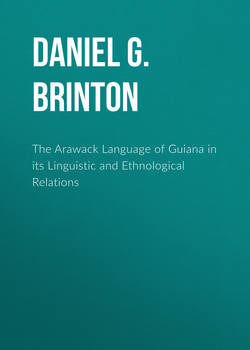Читать книгу The Arawack Language of Guiana in its Linguistic and Ethnological Relations - Daniel G. (Daniel Garrison) Brinton - Страница 1
THE ARAWACK LANGUAGE OF GUIANA IN ITS LINGUISTIC AND ETHNOLOGICAL RELATIONS.
BY D. G. BRINTON, M. D
ОглавлениеThe Arawacks are a tribe of Indians who at present dwell in British and Dutch Guiana, between the Corentyn and Pomeroon rivers. They call themselves simply lukkunu, men, and only their neighbors apply to them the contemptuous name aruac (corrupted by Europeans into Aroaquis, Arawaaks, Aroacos, Arawacks, etc.), meal-eaters, from their peaceful habit of gaining an important article of diet from the amylaceous pith of the Mauritia flexuosa palm, and the edible root of the cassava plant.
They number only about two thousand souls, and may seem to claim no more attention at the hands of the ethnologist than any other obscure Indian tribe. But if it can be shown that in former centuries they occupied the whole of the West Indian archipelago to within a few miles of the shore of the northern continent, then on the question whether their affiliations are with the tribes of the northern or southern mainland, depends our opinion of the course of migration of the primitive inhabitants of the western world. And if this is the tribe whose charming simplicity Columbus and Peter Martyr described in such poetic language, then the historian will acknowledge a desire to acquaint himself more closely with its past and its present. It is my intention to show that such was their former geographical position.
While in general features there is nothing to distinguish them from the red race elsewhere, they have strong national traits. Physically they are rather undersized, averaging not over five feet four inches in height, but strong-limbed, agile, and symmetrical. Their foreheads are low, their noses more allied to the Aryan types than usual with their race, and their skulls of that form defined by craniologists as orthognathic brachycephalic.
From the earliest times they have borne an excellent character. Hospitable, peace-loving, quick to accept the humbler arts of civilization and the simpler precepts of Christianity, they have ever offered a strong contrast to their neighbors, the cruel and warlike Caribs. They are not at all prone to steal, lie, or drink, and their worst faults are an addiction to blood-revenge, and a superstitious veneration for their priests.
They are divided into a number of families, over fifty in all, the genealogies of which are carefully kept in the female line, and the members of any one of which are forbidden to intermarry. In this singular institution they resemble many other native tribes.
